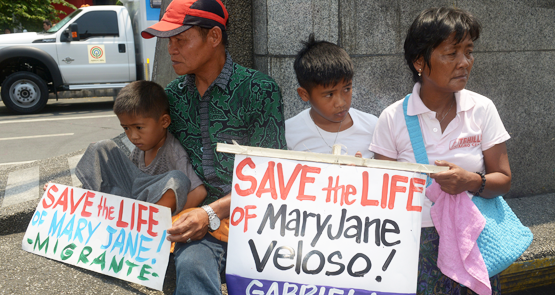Mary Jane Veloso’s parents and two sons protest against her death sentence
Pleas for mercy for Bali Nine drug smugglers Andrew Chan and Myuran Sukumaran went unanswered, but a last-minute outpouring of support and empathy from the Indonesian people might have saved 30-year-old Filipina Mary Jane Veloso from an Indonesian firing squad last night.
The dramatic reprieve came as eight other death row inmates, including Chan and Sukumaran, were executed as scheduled.
A huge response on Twitter caused the #SaveMaryJaneVeloso and #BiarkanHidup to become Indonesia’s top trending topic in the hours leading up to the executions, with a heart-rending picture of Veloso’s two young sons holding a poster calling for her life to be spared going viral.
The push to save Veloso had gathered momentum in recent days but received a huge boost yesterday when the woman who initially lured Veloso to Indonesia on the promise of work as a maid turned herself into police in the Philippines.
Veloso was caught with a suitcase containing 2.2 kilograms of heroin in the city of Yogyakarta in 2010. She has always maintained she was set up, and as in the case of Chan and Sukumaran there have been allegations of corruption made against the judges who sentenced her to death.
At the time of writing it was still unclear as to the exact reason why Veloso had been saved, but it provided some unexpected good news on an otherwise awful evening in which Indonesia’s normally sensationalist television channels mostly treated the story with respect.
I say mostly, as sadly a couple chose to treat it as a macabre sporting event requiring dramatic music and action-packed montages, rather than the ending of eight people’s lives.
Once Attorney-General HM Prasetyo held a live press conference shortly after 9pm local time confirming that the executions would go ahead, most of the major news channels such as Kompass and Metro TV went to rolling coverage, with talking heads pontificating from the studio and regular live crosses to reporters in Cilacap.
Most of the opinion seemed to be supportive of the hardline stance of President Joko Widodo. This again exposed the difference between the Bahasa- and English-speaking press on the issue.
Jakarta’s two English dailies, The Jakarta Post and The Jakarta Globe, have been broadly against the executions, with the Globe particularly strident, issuing editorials denouncing them on a near daily basis.
Both splashed the “mercy” sign beneath the Sydney Harbour Bridge across their front pages yesterday, while the national broadsheet Kompass relegated it to page three.








That’s the first I have heard of this story, and all I can say is thank whichever deity does it for you.
Her case is particularly egregious.